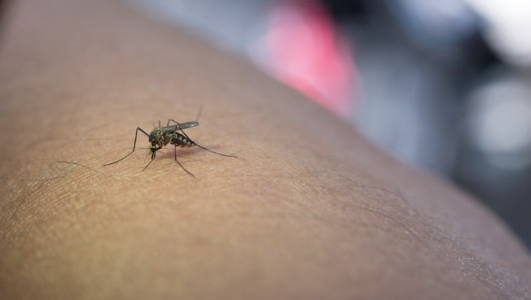Researchers solve flesh-eating Buruli ulcer mystery
By
VanessaC
- Replies 10
Researchers solve flesh-eating Buruli ulcer mystery
For years, the cause of the debilitating Buruli ulcer has eluded scientists and left communities vulnerable.
But after decades of searching, Melbourne researchers from the Doherty Institute have confirmed the culprits behind the spread of this debilitating disease.
This groundbreaking discovery, published in the esteemed Nature Microbiology journal, has significant implications for public health and disease prevention strategies.
The Buruli ulcer is a a flesh-eating disease caused by the bacterium Mycobacterium ulcerans.
The disease can lead to severe skin damage, including painful lumps, limb swelling, and intense pain.
In 2023, Victoria recorded 363 cases of the ulcer—a record high.
The disease seems to cluster around the Mornington Peninsula and Geelong areas, with sporadic cases also reported in Inner Melbourne.
The link between mosquitoes and the Buruli ulcer has been suspected for a long time, but proving it was no easy task.
'How Buruli ulcer is spread to people has baffled scientists and public health experts for decades,' Lead Researcher Professor Tim Stinear said.
'So now that mystery is solved.'
Over five years, the researchers trapped and forensically tested more than 65,000 mosquitoes on the Mornington Peninsula.
They found bacteria in the insects identical to that found in ulcer patients, providing irrefutable evidence of the mosquito-Buruli ulcer link.
Professor Paul Johnson, a Specialist in infectious diseases, stated that there was no prior evidence of bacteria spreading in this manner.
'Our team faced considerable scepticism, so we gathered irrefutable evidence to support our claim,' he said.
This discovery has significant implications for public health and disease prevention.
The findings suggest that efforts to prevent the spread of the Buruli ulcer should focus on controlling mosquito populations and preventing bites.
'This research is significant because we can all take simple actions, like applying insect repellent and removing stagnant water around the house, to protect the community and reduce the risk of Buruli ulcer,' said Professor Johnson.
The team is now focused on trialling a method to reduce mosquitoes in Inner Melbourne.
Given the confirmed link between mosquitoes and Buruli ulcer, it's crucial to take steps to protect yourself from mosquito bites, particularly if you live in or are visiting an area where the disease is prevalent. Here are some tips:

If you notice a persistent lump or ulcer on your skin, particularly if you live in or have visited an area where the disease is prevalent, seek medical attention promptly.
 What are your thoughts on this discovery, members? Have you or someone you know been affected by the Buruli ulcer? Share your experiences and tips for preventing mosquito bites in the comments below.
What are your thoughts on this discovery, members? Have you or someone you know been affected by the Buruli ulcer? Share your experiences and tips for preventing mosquito bites in the comments below.
For years, the cause of the debilitating Buruli ulcer has eluded scientists and left communities vulnerable.
But after decades of searching, Melbourne researchers from the Doherty Institute have confirmed the culprits behind the spread of this debilitating disease.
This groundbreaking discovery, published in the esteemed Nature Microbiology journal, has significant implications for public health and disease prevention strategies.
The Buruli ulcer is a a flesh-eating disease caused by the bacterium Mycobacterium ulcerans.
The disease can lead to severe skin damage, including painful lumps, limb swelling, and intense pain.
In 2023, Victoria recorded 363 cases of the ulcer—a record high.
The disease seems to cluster around the Mornington Peninsula and Geelong areas, with sporadic cases also reported in Inner Melbourne.
The link between mosquitoes and the Buruli ulcer has been suspected for a long time, but proving it was no easy task.
'How Buruli ulcer is spread to people has baffled scientists and public health experts for decades,' Lead Researcher Professor Tim Stinear said.
'So now that mystery is solved.'
Over five years, the researchers trapped and forensically tested more than 65,000 mosquitoes on the Mornington Peninsula.
They found bacteria in the insects identical to that found in ulcer patients, providing irrefutable evidence of the mosquito-Buruli ulcer link.
Professor Paul Johnson, a Specialist in infectious diseases, stated that there was no prior evidence of bacteria spreading in this manner.
'Our team faced considerable scepticism, so we gathered irrefutable evidence to support our claim,' he said.
This discovery has significant implications for public health and disease prevention.
The findings suggest that efforts to prevent the spread of the Buruli ulcer should focus on controlling mosquito populations and preventing bites.
'This research is significant because we can all take simple actions, like applying insect repellent and removing stagnant water around the house, to protect the community and reduce the risk of Buruli ulcer,' said Professor Johnson.
The team is now focused on trialling a method to reduce mosquitoes in Inner Melbourne.
Given the confirmed link between mosquitoes and Buruli ulcer, it's crucial to take steps to protect yourself from mosquito bites, particularly if you live in or are visiting an area where the disease is prevalent. Here are some tips:
Key Takeaways
- Melbourne researchers have confirmed that mosquitoes carry the bacteria responsible for causing flesh-eating Buruli ulcers.
- The confirmation comes after a study published in the respected peer-reviewed journal Nature Microbiology.
- The findings suggest that prevention of Buruli ulcers should focus on mosquito population control and bite prevention.
- The study involved trapping and testing over 65,000 mosquitoes, and the findings are expected to lead to community-protective actions like using insect repellent and removing stagnant water.








